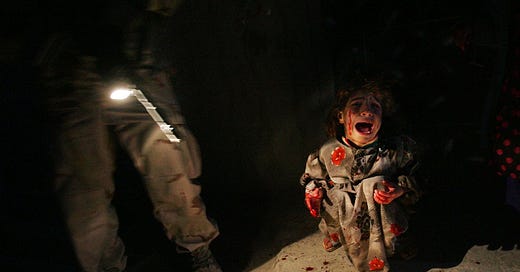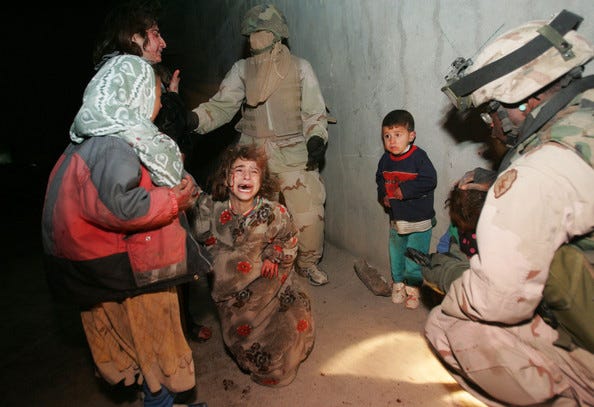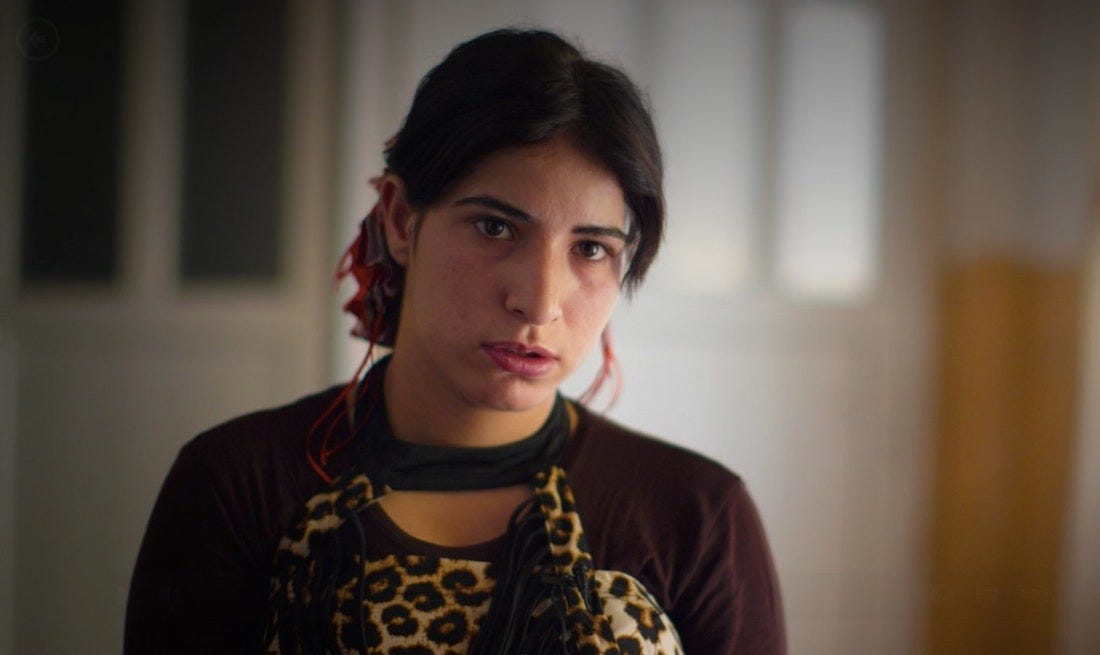There’s a girl I never want to let myself forget. Her name is Samar Hassan and we killed her family.
In January of 2005 in the northern Iraqi town of Tal Afar, Samar, five years old at the time, was riding in the back seat of her parents’ car as they returned from bringing her young brother to the hospital. It was getting dark, and nearing curfew, and her father, likely aware of this, was driving faster than normal. Fearing that the driver was a suicide bomber, an army patrol in the area that evening were given permission to open fire and so they did because that is what army patrols do.
As Specialist Brad Hammond would tell it years later, he and multiple other soldiers fired at least 20 rounds each into the oncoming car. When it finally came to a stop, Samar and her siblings spilled out of the back, their parents now slumped over in the front seat, dead from the torrent of gunfire.
“I was like ‘Oh my god. What did we do? What did we do?” Hammond said in the film “Hondros”, a 2017 documentary about the life of the late, acclaimed conflict photographer Chris Hondros, who was on hand at the shooting.
Hammond still smells what he smelled that night.
“Blood, brains. You ever smelled…” he says in the film, inhaling deeply.
Hondros was embedded with Hammond’s Apache Company at the time. He quickly snapped a series of pictures of the family we destroyed, including the one above, which became one of the most searing and defining images of the war. He’d soon be banished from traveling with the company after disregarding military command’s request not to publish the photos.
Samar’s parents were but two deaths in the conservative estimate of 500,000 or more that came as a direct result of combat or in its aftermath in the collapse of Iraqi infrastructure and the subsequent takeover of parts of the country by the Islamic State, but the photographs Hondros captured of Samar and her siblings — traumatized, bloodied, devastated — did something that reading an abstract number like that can’t ever do. It brought the dead — the distant, unkowable, easily ignorable Iraqi dead — to life.
Look at her face in the photo now. What can she be thinking? Did she have any idea why her parents were murdered. By who?
A subsequent military inquiry determined that the attack on the car was “reasonable in intensity, duration, magnitude."
Samar’s brother, who was badly injured in the shooting as well, was brought to Boston the next year for treatment for his injuries, aid he was afforded in no small part by the widespread attention the photos had garnered and the advocacy of an American aid worker named Marla Ruzicka. Three years later he was eventually murdered in an attack by insurgents. Their uncle, who was taking care of the two children at the time, suspects his home was targeted specifically because the boy had traveled to the United States.
Ruzicka would also be killed in a car bombing in Baghdad not long after.
Hondros would die himself from wounds sustained in a mortar attack while covering the Libyan civil war in 2011.
But Samar. I was trying to remember her name this weekend as the week-long destination wedding like funeral and round-the-clock 24/7 corpse watch for John McCain continued its interminable slog on cable news. I worried for a while I wouldn’t be able to bring something Samar said in an interview last year back to memory. I felt guilty for having let the specificity of her anguish slip from my mind.
The documentary makers behind “Hondros” tracked Samar down for the film. 18 then, they had come to see her, in part, to bring her an apology from Hammond, who appears in the film himself now as a broken man, unable to emotionally process the extent of what he did. Hammond still has nightmares every night, he said, over shots of an overflowing bag of medication, anxiety pills and so on. He still sees Rakan walking down the street when he goes to sleep.
He asked the documentarians to please tell Samar, if they could find her, that he is sorry.
She does not accept the apology.
“Everybody knows my story and saw my picture,” she tells the filmmakers, through a translator.
“But it’s not going to help me with anything.”
She remembers that night. It’s never gone from her thoughts.
“I hear them screaming in my head and the sound of shooting.”
“What would sorry do?” she asks. “They’re gone. Is sorry going to bring them back? No, it won’t. That’s it. It’s done.”
Here’s a tweet that’s gotten almost 100,000 retweets in the 24 hours since it was posted.

George W. Bush sneaking a piece of candy to Michelle Obama is warming my heart . pic.twitter.com/pAtDdIcSeB
September 1, 2018Here’s another tweet, this one from the New Yorker’s Susan Glaser, a take whose sepia-tinted nostalgia theme abounded across social media over the weekend.

Hillary Clinton and Dick Cheney next to each other at John McCain’s funeral... seems so much how Washington used to be, and is no longer. When America hears these stirring patriotic songs today, do they even hear the same words?
September 1, 2018Needless to say, the occasion of McCain’s death has driven the white collar pundit class absolutely fucking insane in all manner of ways.

The angels were crying. Here at CNN - just a few blocks away - no rain. Just there. https://t.co/0Pw2xWb90R
August 31, 2018Here’s what Meghan McCain said about her father, to resounding applause.
“The America of John McCain is generous and welcoming and bold. She is resourceful and confident and secure. She meets her responsibilities. She speaks quietly because she is strong. America does not boast because she has no need. The America of John McCain has no need to be made great again because America was always great.”
I don’t know if any of the smooth-brained dullards in the media eulogizing John McCain — whose own theater of bravery, lest we forget, lead to at least a million and a half deaths, including an estimated 600,000 civilians — remember much from the Bush era, or just how ravenously horny for invading Iraq, or any other country he thought had it coming, McCain was at the time. Distance does have a way of sanding off the edges. But here’s something that came from Bush and McCain’s war I’d like more people to hear. It’s one of the last things Samar says in the documentary about the men — Bush and McCain’s men, our men — who killed her family for nothing.
What would she say to them if they were to tell her they were sorry?
“I will never forgive them. I will just leave it to God. God will punish them,” she said, her voice rising in anger.
“If they were in front of me, I would want to drink their blood,” she said.
“Even then I wouldn’t be satisfied.”






